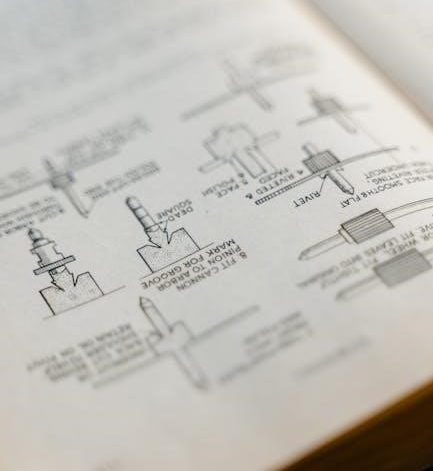Post-Root Canal Instructions: Comprehensive Guide
After a root canal‚ monitor healing‚ attend follow-ups‚ and avoid smoking․ Use pain relievers as prescribed‚ rinse with warm salt water‚ and avoid biting on hard objects․ Follow your dentist’s advice for optimal recovery․

Immediate Post-Procedure Care
After a root canal‚ allow the temporary filling or crown to set by avoiding eating or drinking for 30 minutes․ Refrain from chewing on the treated tooth until numbness subsides to prevent accidental bites or injuries․ Avoid probing the tooth with your tongue to let the area heal․ Stick to soft foods for the first 24-48 hours and avoid hot or cold beverages to minimize discomfort․ Smoking should be avoided immediately after the procedure as it can hinder healing and increase the risk of complications․ Follow your dentist’s specific instructions‚ as they may provide additional guidelines tailored to your case․ Monitoring your condition and reporting any unusual symptoms‚ such as severe pain or swelling‚ to your dentist is crucial․ Proper immediate care ensures the treated tooth begins the healing process effectively‚ reducing the risk of post-procedure issues․
Managing Discomfort and Pain
Discomfort after a root canal is common but typically mild to moderate․ To manage pain‚ take prescribed painkillers or over-the-counter medications like ibuprofen as directed․ Start taking pain relievers before the anesthetic wears off to stay ahead of discomfort․ Use warm salt water rinses (1 teaspoon of salt in a cup of warm water) 2-3 times daily to reduce swelling and ease pain․ Avoid chewing on the treated tooth until it’s fully restored‚ as this can exacerbate soreness․ If pain persists beyond a few days or worsens‚ contact your dentist immediately․ Stick to a soft-food diet initially to minimize strain on the treated tooth․ While some sensitivity is normal‚ severe pain or swelling may indicate complications and requires prompt attention․ Follow your dentist’s advice for managing pain‚ as they may recommend additional measures based on your specific case․ Proper pain management ensures a smoother recovery and reduces the risk of post-procedure complications․
Importance of Oral Hygiene
Maintaining proper oral hygiene is crucial after a root canal to prevent infection and promote healing․ Brush your teeth twice daily using a soft-bristled toothbrush and gentle strokes‚ paying special attention to the treated area․ Floss once a day to remove plaque and food particles that brushing might miss․ Avoid using harsh or abrasive toothpaste that could irritate the treated tooth․ Keep the mouth moist by drinking water regularly to prevent bacteria buildup․ While it’s important to clean thoroughly‚ be gentle around the treated tooth to avoid causing irritation or discomfort․ Continue your regular oral care routine unless advised otherwise by your dentist․ Good oral hygiene helps prevent complications‚ such as infection or abscess formation‚ and ensures the tooth heals properly․ By keeping your mouth clean‚ you support the recovery process and maintain overall dental health․

Diet and Nutrition Recommendations
Following a root canal‚ adhering to a proper diet is essential to support healing and avoid complications․ Stick to soft‚ non-chewing foods like yogurt‚ mashed potatoes‚ and soups for the first few days․ Avoid hard‚ sticky‚ or crunchy foods that could damage the treated tooth or dislodge the temporary filling․ Refrain from consuming extremely hot or cold beverages until numbness subsides to prevent discomfort․ Opt for nutrient-rich foods to promote recovery‚ such as lean proteins‚ vegetables‚ and whole grains․ Limit sugary and acidic foods to reduce the risk of infection․ Stay hydrated by drinking plenty of water to keep your mouth moist and aid in healing․ Avoid using the treated tooth for chewing until it is fully restored with a permanent crown․ A balanced diet helps maintain overall health and supports the healing process after a root canal․ By following these dietary guidelines‚ you can ensure a smoother and more comfortable recovery․
Follow-Up Appointments
Follow-up appointments are crucial for ensuring proper healing and final restoration of the treated tooth․ Typically‚ your dentist will schedule a visit within a week or two after the root canal to check the healing progress and remove any temporary filling or crown․ During this visit‚ they may take X-rays to confirm the effectiveness of the procedure and ensure no signs of infection remain․ If a permanent crown is needed‚ it will be placed during this follow-up to restore the tooth’s strength and functionality․ Missing these appointments can lead to incomplete healing or potential complications‚ such as tooth fracture or reinfection․ Always adhere to the schedule provided by your dentist and contact them immediately if you experience unusual symptoms or concerns between visits․ Regular follow-ups are essential for achieving optimal results and maintaining long-term oral health after a root canal․

Avoiding Complications
To prevent complications after a root canal‚ it is essential to avoid certain habits and behaviors․ Refrain from chewing on hard or sticky foods‚ as this can damage the treated tooth or dislodge the temporary filling․ Smoking should also be avoided‚ as it can impede healing and increase the risk of infection․ Additionally‚ avoid using the treated tooth for biting or chewing until a permanent crown is placed‚ as this can fracture the tooth․ Infections can occur if proper oral hygiene practices are not followed‚ so maintaining regular brushing and flossing routines is critical․ If you notice signs of complications‚ such as increasing pain‚ swelling‚ or pus‚ contact your dentist immediately․ Early intervention can prevent more severe issues‚ such as abscess formation or tooth loss․ By adhering to your dentist’s instructions and avoiding risky behaviors‚ you can minimize the likelihood of complications and ensure a smooth recovery․
Temporary vs․ Permanent Crown Care
After a root canal‚ your tooth may be protected with either a temporary or permanent crown․ Temporary crowns are often placed to safeguard the tooth until a permanent restoration is ready․ It is crucial to avoid chewing or biting on hard or sticky foods with a temporary crown‚ as it may dislodge or fracture․ Smoking should also be avoided‚ as it can hinder healing and increase the risk of complications․ A permanent crown provides long-term protection and restores full functionality to the tooth․ Proper care for both types includes maintaining good oral hygiene‚ such as brushing gently and flossing daily․ Avoid using the treated tooth as a tool for opening packages or biting nails‚ as this can damage the crown․ Regular dental check-ups are essential to monitor the crown’s condition and ensure it remains secure․ By following these guidelines‚ you can extend the lifespan of your crown and maintain the health of your treated tooth․
Smoking and Healing

Smoking after a root canal can significantly hinder the healing process and increase the risk of complications․ Nicotine restricts blood flow to the gums and tooth‚ delaying recovery and reducing the effectiveness of pain relief medications․ Additionally‚ smoking introduces toxins that can infect the treated area‚ leading to potential abscesses or dry sockets․ It is strongly advised to avoid smoking for at least 24 hours after the procedure and ideally to quit or reduce smoking during the entire recovery period․ Continuing to smoke can weaken the immune system‚ making it harder for your body to fight off infections and heal properly․ For optimal healing‚ consider consulting your dentist about resources to help you quit smoking․ By avoiding smoking‚ you can promote faster recovery‚ reduce discomfort‚ and ensure the long-term success of your root canal treatment․ Remember‚ your dentist is a valuable resource for guidance and support during your recovery journey․

Managing Swelling
Swelling after a root canal is common and typically subsides within a few days․ To manage swelling‚ apply an ice pack to the affected area for 15-20 minutes at a time‚ several times a day․ Keep your head elevated while resting to reduce fluid accumulation․ Gentle massages around the swollen area can also help alleviate discomfort․ Avoid hot beverages or foods‚ as they may worsen swelling․ If swelling persists or worsens‚ contact your dentist immediately‚ as it could indicate an infection․ Over-the-counter anti-inflammatory medications‚ such as ibuprofen‚ can help reduce swelling and ease discomfort․ Saltwater rinses (1 teaspoon of salt in warm water) can also aid in reducing inflammation and promoting healing․ Monitor your symptoms closely and follow your dentist’s advice for managing swelling effectively․ By taking these steps‚ you can minimize discomfort and support your recovery process․
Pain Relief Medications
Managing pain after a root canal is crucial for a comfortable recovery․ Over-the-counter pain relievers like ibuprofen or naproxen are effective for mild to moderate discomfort․ Start taking medication before the anesthesia wears off to prevent pain from intensifying․ Follow the recommended dosage on the label or as advised by your dentist․ If pain persists beyond 4-5 days or becomes severe‚ contact your dentist‚ as this may indicate an infection or complications․ Avoid alcohol while taking pain medication‚ as it can interfere with healing and cause side effects․ Prescription painkillers may be prescribed in rare cases of severe pain․ Always inform your dentist of any allergies or medical conditions before taking medication․ Monitor your symptoms and adjust your pain management strategy as needed․ Proper use of pain relief medications ensures a smoother and more comfortable healing process after your root canal treatment․

Salt Water Rinses
Salt water rinses are a simple yet effective way to promote healing and reduce discomfort after a root canal․ Dissolve one teaspoon of salt in a cup of warm water and swish the solution gently around your mouth for 30 seconds before spitting it out․ Repeat this process 2-3 times daily‚ especially after meals‚ to help reduce swelling‚ kill bacteria‚ and soothe the treated area․ Avoid using hot water‚ as it may irritate the tooth‚ and opt for unrefined or non-iodized salt for better results․ Salt water rinses can also help cleanse the area if brushing or flossing is uncomfortable․ However‚ do not use harsh mouthwashes or additives‚ as they may interfere with the healing process․ Start rinsing 24-48 hours after the procedure and continue for up to a week or as advised by your dentist․ This practice complements your oral hygiene routine and supports a smooth recovery․
Avoiding Hard or Sticky Foods
Avoiding hard or sticky foods is crucial after a root canal to protect the treated tooth and ensure proper healing․ Hard foods‚ such as nuts‚ hard candies‚ or ice‚ can damage the tooth or dislodge the temporary filling․ Similarly‚ sticky foods like caramel‚ toffee‚ or chewing gum can pull out the filling or fracture the tooth․ This is especially important if the tooth is waiting for a permanent crown‚ as it may be more vulnerable during the healing process․ Chewing on the opposite side of your mouth can help reduce stress on the treated tooth․ Opt for soft‚ easy-to-chew foods like yogurt‚ mashed potatoes‚ or soft-cooked vegetables during the initial recovery period․ Avoid using the treated tooth for biting or tearing packages‚ as this can cause unnecessary strain; Continue avoiding hard or sticky foods until your dentist confirms the tooth is fully restored and ready for normal use․ This precaution minimizes the risk of complications and supports a smooth recovery․
Brushing and Flossing Techniques
Maintaining proper oral hygiene is essential after a root canal to prevent infection and promote healing․ Brush your teeth twice daily with a soft-bristled toothbrush and fluoride toothpaste‚ using gentle circular motions․ Pay special attention to the treated tooth‚ but avoid applying excessive pressure‚ which could irritate the area․ Floss once a day to remove plaque and food particles between your teeth‚ especially around the treated tooth‚ but be gentle to avoid discomfort or bleeding․ Use a fluoride mouthwash if recommended by your dentist to further cleanse the mouth․ Avoid using harsh or abrasive products that could damage the tooth or surrounding tissues․ Continue your regular brushing and flossing routine unless instructed otherwise by your dentist․ Proper oral hygiene helps maintain the health of your treated tooth and supports the overall healing process․ By following these techniques‚ you can ensure a smooth recovery and prevent potential complications․

Avoiding Hot or Cold Beverages
Avoiding hot or cold beverages after a root canal is crucial to prevent discomfort and sensitivity․ The treated tooth may be sensitive due to the procedure‚ and extreme temperatures can exacerbate this discomfort․ Stick to room-temperature foods and drinks for the first few days to minimize irritation․ If you must consume hot or cold beverages‚ use a straw to bypass the treated tooth․ This reduces direct contact and helps avoid pain․ Avoid testing the tooth’s sensitivity with hot or cold stimuli‚ as this can delay healing․ If sensitivity persists beyond a few days‚ consult your dentist to rule out complications․ Protecting the tooth from temperature extremes ensures a smoother recovery and prevents unnecessary pain․ By adhering to this guideline‚ you can promote healing and maintain comfort during the post-root canal period․
Monitoring Healing Progress
Monitoring healing progress after a root canal is essential to ensure proper recovery․ Keep track of any changes in sensitivity‚ swelling‚ or discomfort․ Most patients experience improvement within a few days‚ but some may have mild symptoms for weeks․ If pain or swelling worsens‚ contact your dentist immediately‚ as this could indicate complications․ Attend all scheduled follow-up appointments to allow your dentist to assess the healing process․ They may take X-rays to verify if the treated area is healing as expected․ Avoiding irritants‚ such as hot or cold foods‚ and maintaining good oral hygiene can support healing․ If you notice unusual symptoms‚ such as increased sensitivity or discharge‚ inform your dentist promptly․ Proper monitoring ensures any potential issues are addressed early‚ promoting a successful outcome․ Healing progress varies‚ so staying vigilant and following your dentist’s guidance is key to a smooth recovery․
Emergency Situations
In rare cases‚ emergency situations may arise after a root canal․ If you experience severe pain‚ swelling‚ or increased sensitivity that doesn’t improve with medication‚ contact your dentist immediately․ Other signs of complications include discharge‚ a bad taste‚ or visible infection․ If your temporary filling falls out‚ this can expose the tooth to bacteria‚ leading to further issues․ In such cases‚ seek urgent dental care to prevent infection or abscess formation․ If you develop a fever or swelling that spreads beyond the treated area‚ it may indicate an infection requiring antibiotics․ Emergency situations often require prompt attention to avoid further damage or the need for more extensive treatment․ Keep your dentist’s contact information handy and don’t hesitate to reach out if you notice any unusual or worsening symptoms․ Addressing emergencies quickly can prevent complications and ensure the success of your root canal treatment․
Long-Term Tooth Care
After a root canal‚ long-term tooth care is essential to ensure the treated tooth remains healthy and functional․ Regular dental checkups are crucial to monitor the tooth’s condition and prevent future issues․ Brushing twice daily with a fluoride toothpaste and flossing once a day will help maintain oral hygiene and prevent plaque buildup․ Avoid chewing on hard or sticky foods‚ as this can damage the tooth or crown․ If a permanent crown is placed‚ it is designed to protect the tooth‚ but proper care is still necessary to avoid chipping or cracking․ Stay hydrated and maintain a balanced diet to support overall oral health․ Attend routine cleanings and exams to ensure the tooth remains free of decay or infection․ With proper care‚ a tooth treated with a root canal can last for many years․ Consistent oral hygiene practices and regular dental visits are key to preserving your smile and preventing future complications․
Lifestyle Adjustments for Recovery
After a root canal‚ making certain lifestyle adjustments can significantly aid in your recovery and overall oral health․ Avoid smoking‚ as it can hinder the healing process and increase the risk of complications․ Limit consumption of sugary and acidic foods to prevent further tooth decay․ Incorporate a balanced diet rich in vitamins and minerals to support your immune system and promote healing․ Stay hydrated to maintain saliva production‚ which helps neutralize acids and remineralize teeth․ Avoid chewing tobacco or engaging in habits that could strain the treated tooth․ If you grind your teeth‚ consider wearing a mouthguard at night to protect the tooth from additional stress․ Manage stress through relaxation techniques‚ as stress can impact oral health․ Finally‚ prioritize regular dental checkups to monitor your recovery and ensure long-term success․ By adopting these lifestyle adjustments‚ you can enhance your recovery and maintain a healthy‚ functional smile for years to come․




